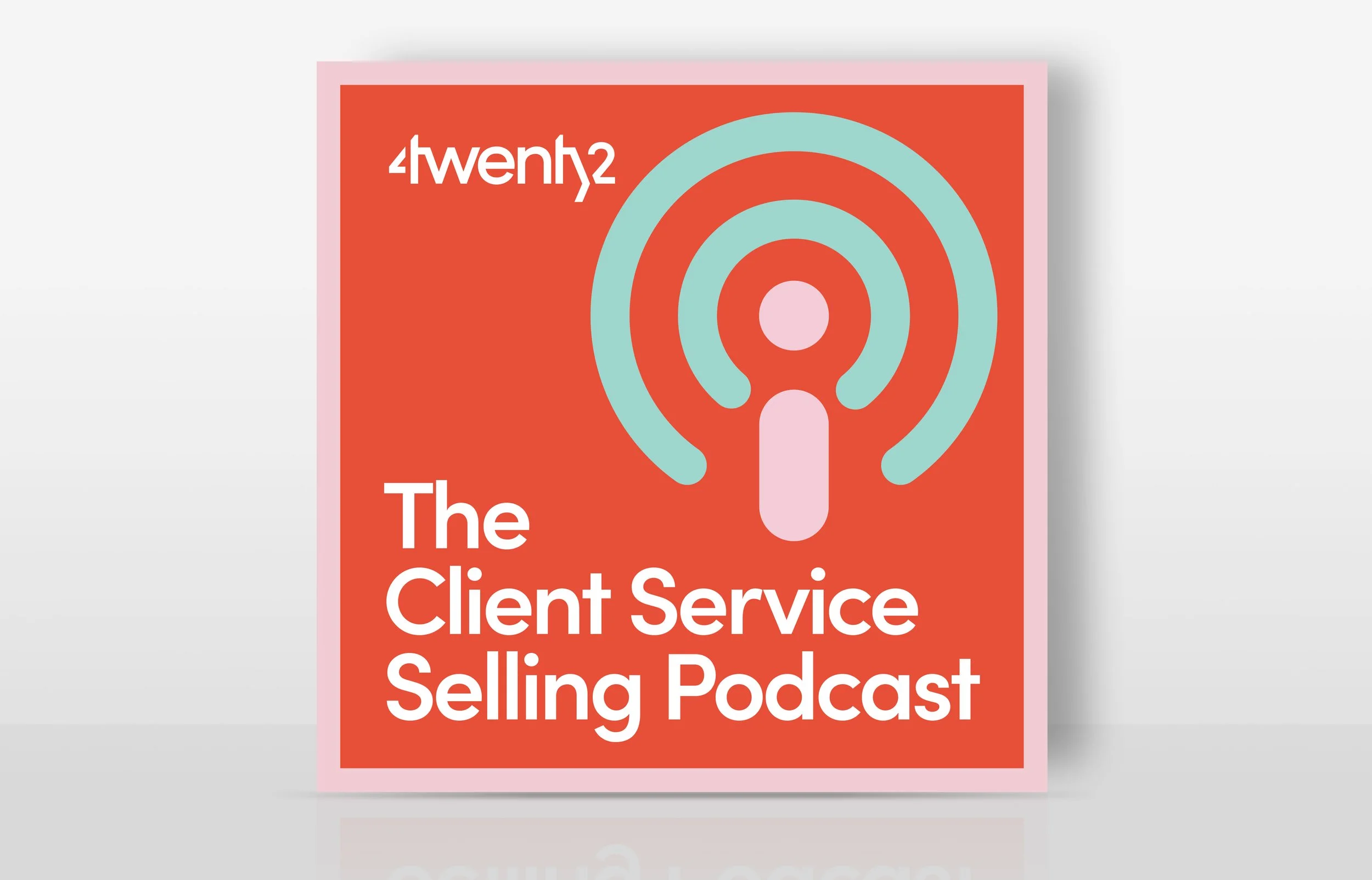Unleashing your Client Team’s IMPACT in the rest of 2024: A Client Service Selling Podcast summary
With time flying in 2024 we thought it would be good to bring you our latest podcast episode in written (and edited!) format, just in case you prefer reading to listening.
It’s true to say we love doing the podcast and have had some genuinely heart-warming complements about it. We know of a few senior commercial people applying the sales training tips we give, and already getting results.
If you see anything related to account development, sales or clients you would like to talk to us further about, drop us a line on our contact page.
Podcast Episode 3 – It’s all about IMPACT
This time, we're moving on from building knowledge to how to use it to drive impact, and therefore growth.
But before then we are going to have our own impact by answering a couple of questions that we got sent through by agency leaders:
We've got fantastic relationships with big organisations and contacts within those organisations. How do we proactively extend those relationships to new people within those existing clients?
This is part of what we deliver quite often during our workshops. Driving penetration is key to every brand’s growth, and it is true for the organisation that you work for. And part of our job is to expand our networks. Now, one of the things that I think really works is to think about those fantastic relationships and then reflect on what's in it for them to introduce you to others. How would they personally benefit from referring you around the organisation? They're only going to refer you around their organisation if they're going to personally gain from that. So it all starts with what's in it for them. And once you've worked that out, you can start to build a plan around it.We've got the knowledge now; it took a while to actually get it. We obviously want to use it really well, we've invested quite a lot of time and energy in this. So how do we go ahead and use it in the best way possible?
It’s known that knowledge drives credibility, it gives you that real sense of building trust with your clients. But where you can use it most impactfully is in how you ask your questions, and moving from just really boring open questions to what we call context questions, or knowledge-based questions.
Let me give you an example. You go in and see your client, it's the beginning of the year, good time to catch up on their strategy and plans for 2024. Right? You go in and say, really nice to meet you. Could you give us an update on what your strategic priorities are for this year? Then going into the next kind-of interesting question.
But not very differentiating, or not very useful to the client.
If you go into the client and say, just looking at your plans, I’m really clear on this part of your strategy, but I'm less clear about this part. And I wonder if you could just give me a bit more information about that. Or if you say, I've done a lot of digging around, I couldn't find anything about where you're investing this year. Is that something that you're able to share with me?
It's demonstrating you care because you prepared and showed you tried. They lean into the answer more than if you just say, can you tell me what are your priorities? They just lean away from you.
Brilliant. We just answered a couple of questions, which we hope has provided you with some food for thought. We thought to move on, we would ask you our own question about the impact you have.
I'll give you four answers from which to choose.
What do you currently see as the main driver of your agencies impact with clients? Option number one, is it all about the work that you deliver? Option two, the client relationships you have? Option three, the technical skills of your team or option 4 - the ubiquitous ‘other’?
Can I choose all of them?
You can, but you'd be wrong 😊!
It's option 2, the relationships that you have. Just think about that for a second. How much energy do you put into developing your people to build deeper client relationships versus developing them technically?
It’s one of the things that we see nowhere near close enough of, is prioritising measuring and creating really strong relationships. And it’s been proven that the softer things tend to have the biggest impact.
The biggest thing that someone remembers, after meeting you, is the experience that you have created. Can you put a metric around that? Maybe not. But it's something that really needs planning in the right way to give a fantastic experience to clients
Let's go back to reminding ourselves what the whole purpose of this podcast is, which is to make growth accessible for your client service team.
And we’re saying one of the best ways of doing it is to help them be better at their relationships with their clients.
So helping them do that should be a wonderful opportunity for them to unlock commercial growth within their clients. But because it's such a massive subject, it's really tricky to know where to start.
It covers the whole gamut of client management, from sending emails to writing proposals through to presenting debriefs and so forth.
But out of all of the client activity that a client service person does, the easiest and best place to start that will have the biggest impact is the conversation.
When we talk to our clients a lot of them say, well, I'm already being impactful. I'm already discovering what my clients really need. I'm already delivering against XYZ metrics, I think I'm being really impactful already.
They are, but in the wrong space.
It's still important to be impactful against the clients KPIs, and those kind of business fundamentals. That's all great and they'll be getting impact for the business. But it's not the most important part of impact.
It isn't, because at the end of the day, what you're talking to is a human being and what another human being wants from you. To be someone that they would describe as impactful to them personally, is helping with their own personal motivations and agendas. That's what human beings like - we surround ourselves with people that can help us as individuals. It may be people that pick us up emotionally and give us energy, help to see things clearly.
In work it’s exactly the same. We surround ourselves with the people that add the most value, that deliver the most impact; the ones that help us personally.
And the one big lightbulb moment that you can give to your teams is to help them see their clients as human beings that have their own personal drivers, that if you can deliver against those drivers, you will inherently be more impactful.
But it's something that is so easy to overlook. Hence, the reason we banged on a little bit about the kind of business KPIs etc, because it's what everybody talks about.
And if you think maybe about a proposal you've written, we would bet that you spend a disproportionate amount of time working on the cost. And working on adding value, and maybe even giving gold, silver bronze options, and seeing where they can have discounts without them even asking for it, compared to really focusing on what it means to the person reading it. But if you write it with the person in mind as your core focus, the impact you will have will be tenfold.
So think about it like this, if you are my client service representative, and you're helping me keep my job, will I want to speak to you?
Yes.
It's a pretty straightforward answer, isn't it? If you're my client service representative, and I want get to the next rung of my career ladder. And you're saying you've got in touch to say you can help me do that. Do I want to hear from you?
Yes. It is a bit playschool isn’t it?
But these are the things that are really the ‘simple and done’ kind of points that we're trying to make here. And if I want to look good in front of the C suite, for example, and you're saying you can make me look really X-Hot in front of the C suite? Will I want to hear from you? Yes!
Okay, so how are we going to do that?
Everyone assumes that being impactful is delivering this light bulb number, this amazing piece of advice, an incredible infographic, this presentation that goes viral. Some of the most impactful things you can do are really under the radar, because it's what's important to that individual right then and there. And, for us, the biggest thing you can do with your teams is to sit down with them, in your client planning phase. Just go right, okay, who do we know within this client? Do we know what's driving them? And are we helping them achieve it? Those are the questions that really matter.
Now we often leave this on a kind of one tip to take away from the podcast. But how do you turn a conversation towards being able to find out what the motivators are of the client as a person across the table from you?
Well, the one thing is one word. You. It totally turns and rephrases a question from a business to a personal one.
Take an example of discussing a project. How will we know it's successful? It’s a great question to ask a client at maybe project kickoff or when you're trying to discover their needs to write a proposal.
You'll probably get some business KPIs where we need the brand to grow by x, it needs to be showing this ROI, and so on.
If you then ask the same question, but say, so thinking about the project, what would make it a success for YOU, you're gonna get a completely different set of answers. And that's the difference. To have the success conversation, as well as the success for you conversation is the way that you're going to give yourself the best chance of being more impactful in the future.
I think out of the three podcasts we've run this probably the simplest tip we've given out, but it will have the biggest impact.
Now that you know what impact is, give yourself a score out of 10 on how well you think yourself and your teams are delivering it.
See you next time!



